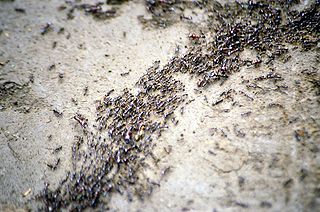Operations research, often shortened to the initialism OR, is a discipline that deals with the development and application of analytical methods to improve decision-making. The term management science is occasionally used as a synonym.

In computer science and operations research, the ant colony optimization algorithm (ACO) is a probabilistic technique for solving computational problems which can be reduced to finding good paths through graphs. Artificial ants stand for multi-agent methods inspired by the behavior of real ants. The pheromone-based communication of biological ants is often the predominant paradigm used. Combinations of artificial ants and local search algorithms have become a method of choice for numerous optimization tasks involving some sort of graph, e.g., vehicle routing and internet routing.
A fully polynomial-time approximation scheme (FPTAS) is an algorithm for finding approximate solutions to function problems, especially optimization problems. An FPTAS takes as input an instance of the problem and a parameter ε > 0. It returns as output a value which is at least times the correct value, and at most times the correct value.
Uniform machine scheduling is an optimization problem in computer science and operations research. It is a variant of optimal job scheduling. We are given n jobs J1, J2, ..., Jn of varying processing times, which need to be scheduled on m different machines. The goal is to minimize the makespan - the total time required to execute the schedule. The time that machine i needs in order to process job j is denoted by pi,j. In the general case, the times pi,j are unrelated, and any matrix of positive processing times is possible. In the specific variant called uniform machine scheduling, some machines are uniformly faster than others. This means that, for each machine i, there is a speed factor si, and the run-time of job j on machine i is pi,j = pj / si.
Single-machine scheduling or single-resource scheduling is an optimization problem in computer science and operations research. We are given n jobs J1, J2, ..., Jn of varying processing times, which need to be scheduled on a single machine, in a way that optimizes a certain objective, such as the throughput.
Optimal job scheduling is a class of optimization problems related to scheduling. The inputs to such problems are a list of jobs and a list of machines. The required output is a schedule – an assignment of jobs to machines. The schedule should optimize a certain objective function. In the literature, problems of optimal job scheduling are often called machine scheduling, processor scheduling, multiprocessor scheduling, or just scheduling.
The modified due-date (MDD) scheduling heuristic is a greedy heuristic used to solve the single-machine total weighted tardiness problem (SMTWTP).
Awi Federgruen is a Dutch/American mathematician and operations researcher and Charles E. Exley Professor of Management at the Columbia Business School and affiliate professor at the university's Fu Foundation School of Engineering and Applied Science.
Job-shop scheduling, the job-shop problem (JSP) or job-shop scheduling problem (JSSP) is an optimization problem in computer science and operations research. It is a variant of optimal job scheduling. In a general job scheduling problem, we are given n jobs J1, J2, ..., Jn of varying processing times, which need to be scheduled on m machines with varying processing power, while trying to minimize the makespan – the total length of the schedule. In the specific variant known as job-shop scheduling, each job consists of a set of operationsO1, O2, ..., On which need to be processed in a specific order. Each operation has a specific machine that it needs to be processed on and only one operation in a job can be processed at a given time. A common relaxation is the flexible job shop, where each operation can be processed on any machine of a given set.
Flow-shop scheduling is an optimization problem in computer science and operations research. It is a variant of optimal job scheduling. In a general job-scheduling problem, we are given n jobs J1, J2, ..., Jn of varying processing times, which need to be scheduled on m machines with varying processing power, while trying to minimize the makespan – the total length of the schedule. In the specific variant known as flow-shop scheduling, each job contains exactly m operations. The i-th operation of the job must be executed on the i-th machine. No machine can perform more than one operation simultaneously. For each operation of each job, execution time is specified.
Joern Meissner is a German academic, business consultant, entrepreneur and Professor of Supply Chain Management & Pricing Strategy at Kühne Logistics University in Hamburg.
The berth allocation problem is a NP-complete problem in operations research, regarding the allocation of berth space for vessels in container terminals. Vessels arrive over time and the terminal operator needs to assign them to berths in order to be served as soon as possible. Different factors affect the berth and time assignment of each vessel.
In the mathematical modeling of job shop scheduling problems, disjunctive graphs are a way of modeling a system of tasks to be scheduled and timing constraints that must be respected by the schedule. They are mixed graphs, in which vertices may be connected by both directed and undirected edges. The two types of edges represent constraints of two different types:
In scheduling, tardiness is a measure of a delay in executing certain operations and earliness is a measure of finishing operations before due time. The operations may depend on each other and on the availability of equipment to perform them.
Stochastic scheduling concerns scheduling problems involving random attributes, such as random processing times, random due dates, random weights, and stochastic machine breakdowns. Major applications arise in manufacturing systems, computer systems, communication systems, logistics and transportation, and machine learning, among others.
Maria Grazia Speranza is an Italian applied mathematician and operations researcher. Her research involves the application of mathematical optimization to problems including portfolio optimization and the combination of inventory management with vehicle routing.
Identical-machines scheduling is an optimization problem in computer science and operations research. We are given n jobs J1, J2, ..., Jn of varying processing times, which need to be scheduled on m identical machines, such that a certain objective function is optimized, for example, the makespan is minimized.
Unrelated-machines scheduling is an optimization problem in computer science and operations research. It is a variant of optimal job scheduling. We need to schedule n jobs J1, J2, ..., Jn on m different machines, such that a certain objective function is optimized. The time that machine i needs in order to process job j is denoted by pi,j. The term unrelated emphasizes that there is no relation between values of pi,j for different i and j. This is in contrast to two special cases of this problem: uniform-machines scheduling - in which pi,j = pi / sj, and identical-machines scheduling - in which pi,j = pi.

Philippe Baptiste is a French engineer, academic and researcher. Baptiste is most well known as the president of the National Centre for Space Studies CNES in addition to his several books and scientific publications and communications in the field of algorithms, combinatorial optimization, operational research and artificial intelligence.
Fractional job scheduling is a variant of optimal job scheduling in which it is allowed to break jobs into parts and process each part separately on the same or a different machine. Breaking jobs into parts may allow for improving the overall performance, for example, decreasing the makespan. Moreover, the computational problem of finding an optimal schedule may become easier, as some of the optimization variables become continuous. On the other hand, breaking jobs apart might be costly.


